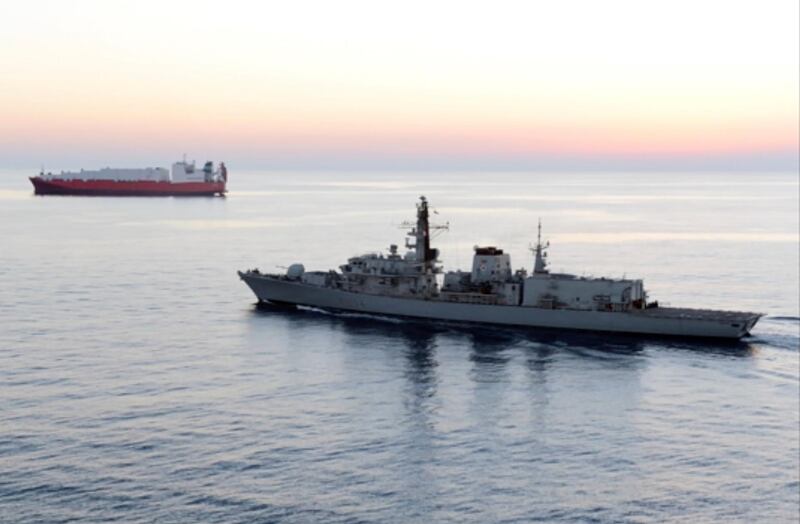It is no longer good enough for European states to blame US President Donald Trump for rising regional tensions and avoid getting embroiled themselves.
Nor is it sufficient for powerful countries to view Iran as an irritable state that can be appeased from a distance.
Because recent events have transformed a stand-off into a crisis.
When the HMS Montrose was forced to position itself between a British oil tanker and Iranian attack boats last week, the calculus changed not just for London but all the major European economies.
Tehran has a well-known and easily roused animus for Britain. Hardliners and agitators stir a form of hatred against the “Old Fox” that pre-dates the 1979 revolution.
The prayer leader at Tehran's Friday prayers warned that the UK would surely be delivered a "slap" in retaliation for seizing the Iranian supertanker Grace 1 and its 2.1 million barrels of crude. The vessel, which was en route to Syria, is being held at Gibraltar and could be requisitioned and sold off.
Iranian President Hassan Rouhani has warned of "consequences" for the British intervention.
As self-appointed guardian of the 2015 nuclear deal, the EU would like view the attack as another episodic spat.
It continues to defend the Iran deal as viable, arguing that Tehran has exported enriched uranium, mothballed centrifuges and ceased expansion of nuclear facilities.
On Friday, Brussels briefed that a decision on triggering the dispute procedure with the deal would not be taken before the summer break. Yet Iran has already breached two limits within the agreement by increasing its stockpile above the ceiling and enriching the uranium above the 3.67 per cent limit to 4.5 per cent so far and announcing plans to go to 20 per cent.
Brussels obduracy is really a position against Mr Trump and his decision to withdraw from the agreement last year.
Mr Trump's predecessor, Barack Obama, and others argued in 2015 that the deal would temper Iran’s wider foreign policy. However, Iran doubled down on regional aggression and increased its missile and arms supplies to proxies, from Yemen to Syria.
After sanctions were revoked by Mr Obama, hundreds of millions of dollars flowed to the Islamic Revolutionary Guard Corps to bolster the Syrian regime, upgrade Lebanese Hezbollah's offensive capabilities, arm the Houthis in Yemen and expand a missile programme with longer ranges and increased sophistication.
This behaviour amounts to a breach of trust. Mr Trump recognised it for what it was and called it out. His criticism of the deal was justified and has left the Europeans more exposed to Iranian pressure.
The nuclear deal was never wholly about the nuclear programme but that is how Brussels wants to define its policy. Even in this core area, Tehran’s behaviour should trigger doubts over the ten year sunset arrangement of the deal. A stronger Iran with more resources in 2025 would have the tickets to the club of nuclear powers, having used the interregnum to prepare.
How tenable the European standstill will be after its policymakers return their summer break must be in question.
The Trump administration’s policy of maximum pressure is already provoking Iranian retaliation. The harassment of the British vessel shows that Iran is willing to endanger freedom of navigation in the Gulf as leverage for its political demands.
Europe must now line up alongside the US and the British in sending more naval assets to the area. To refuse to do so would be a reward for Iran’s use of military assets to improve its diplomatic position.
The potential for a flashpoint turning into a confrontation is now very close. Iran’s activities are undermining its own diplomatic campaign.
France sent an envoy to Tehran last week to seek the "beginnings" of de-escalation. This was a smart move.
It is right to take the mediation beyond the narrow lines of salvaging the nuclear deal.
Tehran must face demands that its confidence building measures include ceasing to harass and intercept ships as well as shutting down the flow of arms to its proxies. It is significant that the “gestures” sought by the French presidential envoy Emmanuel Bonne are broader than the nuclear infractions.
A reading of the Iranian actions in breaching the limits is that these are carefully calibrated and designed to be reversed if Tehran can extract concessions from the Europeans.
The problem negotiators face is that the size of the sanctions-evading concessions Iran is demanding are not realistic.
The catch-22 for Europe is that Mr Trump is going further in the opposite direction in the absence of support from America’s traditional allies. The US leader has threatened more sanctions. Washington’s position is logical and sound. Europe should recognise the wider change in Iranian behaviour sought by Mr Trump is in the interest of all sides.





